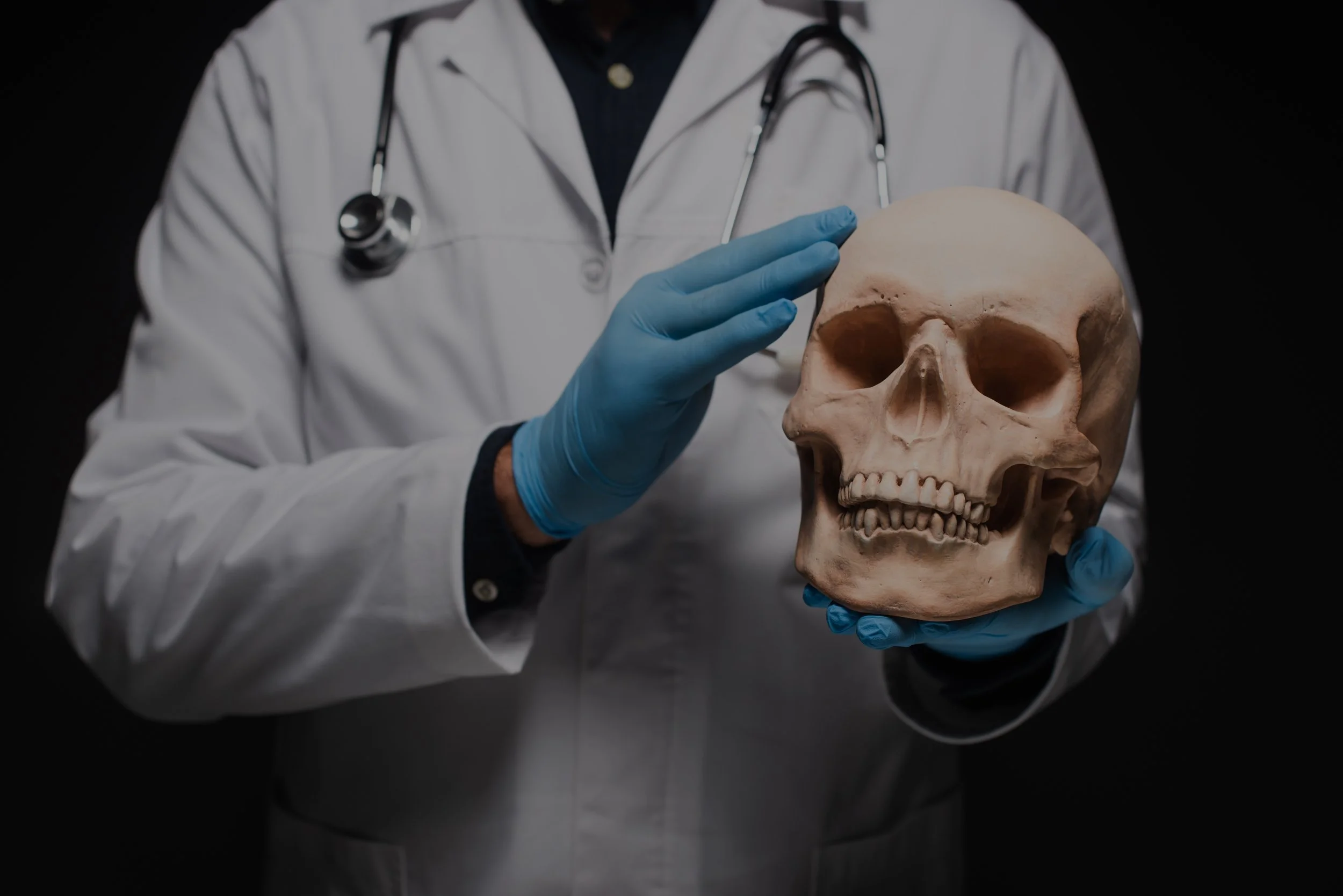
Skull Base Tumor Treatment in New York City | Expert NYC Neurosurgeon
Understanding Skull Base Tumors: Types, Symptoms & Treatment Options
Skull base tumors develop in the complex area at the bottom of the brain where important nerves and blood vessels pass through narrow corridors of bone. Many are benign (noncancerous)—such as pituitary tumors, meningiomas, and vestibular schwannomas (acoustic neuromas)—while others are rare and more aggressive (e.g., chordomas). Because of their location, even benign tumors can affect vision, hearing, balance, hormones, facial movement or sensation.
Common types Dr. Babu treats
Pituitary tumors (adenomas): May cause headaches, vision changes, or hormonal symptoms (fatigue, menstrual or fertility changes, thyroid/adrenal issues). Some types respond to medication, while others require surgery or radiation.
Meningiomas: Usually benign tumors from the brain’s coverings; can cause headaches, seizures, or pressure on nearby nerves if they grow.
Vestibular schwannomas (acoustic neuromas): Typically cause one-sided hearing loss, tinnitus (ringing), imbalance, and sometimes facial numbness.
Other skull base tumors: Chordomas, craniopharyngiomas, and select malignant tumors that require highly specialized, multidisciplinary care.
Symptoms to watch for
Headaches that are persistent or worsening
Vision problems: blurred or double vision, loss of side vision
Hearing/balance issues: hearing loss on one side, tinnitus, dizziness
Facial symptoms: numbness, tingling, weakness, or pain
Hormonal changes: fatigue, weight or temperature intolerance, menstrual or sexual health changes, unexpected breast discharge
Seizures or new neurological changes
When to seek prompt care: sudden or rapidly worsening vision/hearing, new facial weakness or numbness, severe headache, or endocrine emergencies (e.g., sudden vision loss with pituitary symptoms).
How skull base tumors are diagnosed
MRI with contrast (sometimes CT for bone detail) to map the tumor and its relationship to nerves and vessels
Specialized testing based on tumor type: visual field testing, audiogram, and endocrine labs for pituitary tumors
A clear discussion of whether observation, surgery, radiosurgery, or medication is the safest, most effective plan for you
Philosophy of Care
Function first. Safety always. Personalized for you.
Dr. Ramesh P. Babu’s care model is built around preserving what matters most—vision, hearing, facial nerve function, and hormonal health—while treating the tumor effectively.
Least-invasive first when appropriate (medication or endoscopic surgery)
Multidisciplinary planning with ENT/rhinology, neuro-otology, endocrinology, radiation oncology, and neuro-ophthalmology
Shared decision-making: You’ll understand the why, how, and what to expect for each option
Clear recovery roadmap: Honest timelines, complication prevention, and long-term follow-up to keep you well
Educational Background
Why Dr. Babu Is a Trusted Expert
NYC Neurosurgeon with decades of experience treating trigeminal neuralgia and facial pain
NYC neurosurgeon with decades of experience treating trigeminal neuralgia, facial pain, and skull base tumors
M.Ch in Neurosurgery – NIMHANS, Bangalore (India’s premier neuroscience institute)
Neurosurgery Residency – NYU Medical Center under Dr. Joseph Ransohoff
Fellowship in Microvascular & Skull Base Surgery – University of Pittsburgh Medical Center (UPMC), mentored by Dr. Peter Jannetta (pioneer of microvascular decompression) and Dr. Laligam Sekhar
Advanced International Training – Nordstadt Clinic, Hannover under Prof. Majid Samii; and NHNN, Queen Square, London
Director of Neurosurgery – BronxCare Health System; affiliated with Lenox Hill Hospital (Northwell) and NYC Health + Hospitals / South Brooklyn Health
Medical Advisory Board Member – Facial Pain Association (FPA); former member of the Board of Directors
Decades of experience managing pituitary tumors, meningiomas, vestibular schwannomas, chordomas, and complex cranial nerve disorders
Known for precision microsurgery, endoscopic endonasal surgery, and stereotactic radiosurgery planning, with a patient-centered, function-preserving approach
With advanced fellowship training and leadership roles in NYC, Dr. Babu offers the full spectrum—from observation and medication to endoscopic and open skull base surgery—tailored to your goals.
Services & How to Get Started
Comprehensive Evaluation
Detailed review of your symptoms, imaging, hearing/vision changes, and endocrine history
MRI/CT review and, when needed, additional visual field, audiology, and hormone testing
A clear explanation of your tumor type, growth pattern, and risks/benefits of each option
Personalized Treatment Planning
Observation with scheduled imaging when safe
Medication-first strategies for eligible pituitary tumors
Endoscopic endonasal surgery for many midline lesions (no external incision)
Microsurgical approaches for lateral or complex tumors, with careful nerve and vessel protection
Stereotactic radiosurgery / focused radiation as primary or adjunct therapy
Surgery & Hospital Care
Modern skull base techniques, neuronavigation, and intraoperative monitoring to protect function
Close coordination with specialized teams (ENT, neuro-otology, endocrinology, radiation oncology)
Clear postoperative plan: pain control, activity guidance, and follow-up schedule
Long-Term Follow-Up
Surveillance MRI to monitor for recurrence or regrowth
Ongoing endocrine, hearing, and vision assessments as needed
Rehabilitation referrals and supportive care to optimize recovery and quality of life

